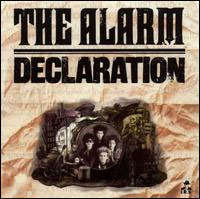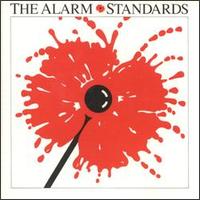 The
Alarm were a great concept on paper. Coming on like the Clash with acoustic
guitars, the band mixed strident (if nebulous) politics with a type of folk-punk
that was way ahead of its time, and it earned them glowing reviews upon the release
of their self-titled
debut EP in 1983. In reality (or, at least, in retrospect), the Alarm were
a well-meaning but mildly talented lot, and ultimately they proved inconsequential
- fodder for dozens of new wave hits compilations and countless "where are
they now" features. Sure didn't seem that way at the time, though, and it's
a bit of a shame that these earnest young lads from Wales didn't become the salvation
of modern rock as they clearly intended. "The Stand," "Sixty-Eight
Guns," and "Marching On" (collected in 1984 on Declaration,
their first full-length LP) were inspiring stuff, and the Alarm seemed to point
towards a new, less nihilistic day for alternative music.
The
Alarm were a great concept on paper. Coming on like the Clash with acoustic
guitars, the band mixed strident (if nebulous) politics with a type of folk-punk
that was way ahead of its time, and it earned them glowing reviews upon the release
of their self-titled
debut EP in 1983. In reality (or, at least, in retrospect), the Alarm were
a well-meaning but mildly talented lot, and ultimately they proved inconsequential
- fodder for dozens of new wave hits compilations and countless "where are
they now" features. Sure didn't seem that way at the time, though, and it's
a bit of a shame that these earnest young lads from Wales didn't become the salvation
of modern rock as they clearly intended. "The Stand," "Sixty-Eight
Guns," and "Marching On" (collected in 1984 on Declaration,
their first full-length LP) were inspiring stuff, and the Alarm seemed to point
towards a new, less nihilistic day for alternative music.
Part of the problem, though, was that the Alarm weren't a concept, they were real
people, and they lusted for mainstream success like most musicians. Hence, their
songs, their performances, and the production of their records veered quickly towards
the mainstream. Most noticeably, the Alarm began to sound suspiciously like the Welsh
version of U2 (who were then approaching their hip zenith) rather than the Welsh
version of Clash. The resemblance just pointed out how the Alarm didn't really measure
up to either standard.
 For
all it's electric bluster, the Alarm's second full-length album, Strength (1985),
can still be called their best overall. Benefiting from an improved sense of dynamics
and more mature musicianship, the Alarm seemed on the verge of something big. With
hindsight, however, the intense title song amounts to a pretty good U2 impersonation
(no small feat, really), and only "Spirit of '76" harkens back to the Alarm's
rabble-rousing halcyon days. Sadly, things went down hill quickly after that, and
later singles like "Sold Me Down The River" - while pleasant enough - sounded
like generic hard rock. The Alarm, it seems, had sold themselves down the
river, unwilling or unable to define their own, unique sense of vision. Despite a
fair amount of airplay and an opening slot on a Bob Dylan tour, the band went nowhere
fast, and by the early 90's the Alarm had disappeared from the American scene.
For
all it's electric bluster, the Alarm's second full-length album, Strength (1985),
can still be called their best overall. Benefiting from an improved sense of dynamics
and more mature musicianship, the Alarm seemed on the verge of something big. With
hindsight, however, the intense title song amounts to a pretty good U2 impersonation
(no small feat, really), and only "Spirit of '76" harkens back to the Alarm's
rabble-rousing halcyon days. Sadly, things went down hill quickly after that, and
later singles like "Sold Me Down The River" - while pleasant enough - sounded
like generic hard rock. The Alarm, it seems, had sold themselves down the
river, unwilling or unable to define their own, unique sense of vision. Despite a
fair amount of airplay and an opening slot on a Bob Dylan tour, the band went nowhere
fast, and by the early 90's the Alarm had disappeared from the American scene.
Nevertheless, the Alarm are worth collecting, if only as an interesting footnote
(and cautionary tale) in the post-punk development of alternative rock. Declaration and Strength are
each good records, while Standards,
a 15-track anthology, culls the band's best rather efficiently. Really, it's all
you need unless you are absolutely obsessed with the 80's - and I know some of you
are....
Lead Alarmists Mike Peters and Dave Sharp have soldiered on in one form or another
till the present, and the bands' albums were reissued in Europe in 2000, remastered
with prodigious bonus tracks - including a version of their classic debut EP, The
Alarm, expanded to no less than 17 tracks. A new retrospective, Best
Of The Alarm (a refurbished edition of an album originally released in Great
Britain in 1998), followed in 2006. [top of page]